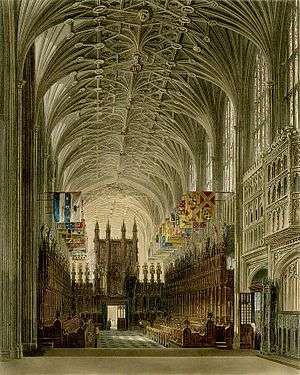William Henry Harris

Sir William Henry Harris KCVO (28 March 1883 - 6 September 1973) was an English organist and composer, affectionately nicknamed "Doc H" by his choristers.
Harris was born in Fulham, London and died in Petersfield. He was a chorister of Holy Trinity, Tulse Hill. At the age of 14, he took up a "flexible" position as Assistant Organist at St David's Cathedral in Wales, followed at 16 by a scholarship to the Royal College of Music where he was Professor of Organ and Harmony from 1921 to 1955. He was organist at St Augustine's Church, Edgbaston from 1911 to 1919 and concurrently of Assistant Organist at Lichfield Cathedral followed in 1919 by becoming Organist successively at New College and in 1929 Christ Church, Oxford, moving to St. George's Chapel, Windsor in 1933.
As Organist and Choirmaster at Windsor, Harris was at his most productive. He produced music for the Three Choirs Festival, was a conductor at both the 1937 and 1953 coronations, and had music premiered at the Proms, all of which led to being appointed KCVO in 1954.
Bruce Nightingale, who became senior chorister at Windsor during the wartime years, describes "Doc H" as having "a fat, usually jolly face with a few wisps of hair across an otherwise bald head." Although choir practice was normally conducted in a "benign atmosphere," Nightingale recounts that Harris would occasionally complain of a "batey practise" and, on the rare occasions he considered a performance mediocre, would scold the choirboys in a loud stage whisper from the organ loft. Harris was involved in the musical education of the teenage Princesses Elizabeth and Margaret Rose, who spent the wartime period at Windsor Castle. Every Monday he would direct madrigal practise in the Red Drawing Room at Windsor, where the two Princesses sang alongside four of the senior choristers with the lower voices augmented by Etonians, Grenadier Guards and members of the Windsor and Eton Choral Society. Jars of Argentinian honey, sent to Windsor by overseas subjects, were donated by the Princesses to the Choir School as a treat for the choristers.[1]
Harris is best remembered for his Anglican church music, though his main achievements were as a choir-trainer. His most famous works are the anthems Faire is the heaven (1925) and to a lesser extent Bring us, O Lord God (1959), both for unaccompanied double choir, and Strengthen ye the weak hands (1949) for choir and organ. His very accessible Communion Service in F was frequently sung in a great many Anglican parish churches up until the 1970s. The canticles Harris in A and Harris in A minor are still sung at Evensong in a number of Anglican cathedrals. He also composed cantatas and organ pieces, as well as the hymn tune Alberta (often used for the words Lead, Kindly Light), and various Anglican psalm chants.
| Cultural offices | ||
|---|---|---|
| Preceded by Hugh Allen |
Organist and Master of the Choristers of New College, Oxford 1919-1929 |
Succeeded by John Dykes Bower |
| Preceded by Charles Hylton Stewart |
Director of Music, St George's Chapel, Windsor Castle 1933-1961 |
Succeeded by Sidney Campbell |
Notes
- ↑ Nightingale 1996, pp. 6–7
References
- Nightingale, Bruce (1996), Seven Rivers To Cross: A Mostly British Council Life, The Radcliffe Press, ISBN 1860641318
External links
- List of works (This list does not include 'Faire is the Heaven' SATB x 2 a cappella)
- "Faire is the Heaven" on YouTube: a 1970 concert performance by Guildford Cathedral Choir, directed by Barry Rose
- Biography at naxos.com